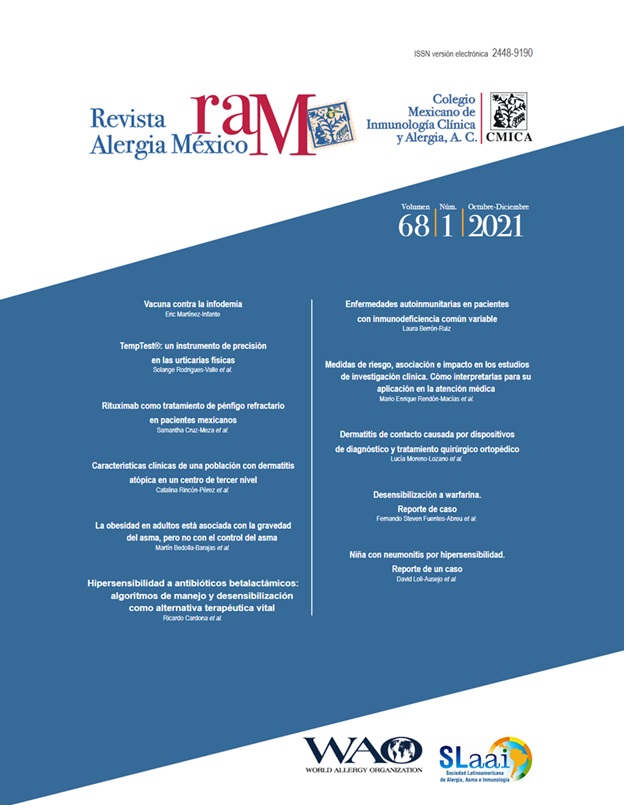Abstract
Background: Pemphigus (Pm) is a chronic and recalcitrant autoimmune disease that affects the skin and mucous membranes. The first line of treatment are systemic corticosteroids; however, there are patients who are refractory to them, as well as to other immunosuppressants. Rituximab has been used as a successful alternative since 2000 with good results but without information on its behavior in the Mexican population.
Objective: To assess the clinical response to treatment with rituximab in Mexican patients with pemphigus.
Methods: This was a cross-sectional, retrospective study in a tertiary hospital, which included patients with moderate-severe pemphigus who had been treated with rituximab from 2007 to 2020.
Results: Six medical records of patients diagnosed with pemphigus were obtained; four of them with Pm vulgaris, and two of them with pemphigus foliaceus; all patients had received systemic immunosuppressive therapy prior to rituximab. All six patients went into remission of the disease in an average of 12.5 weeks.
Conclusion: The use of rituximab for the treatment of patients with moderate-severe Pm who were refractory to immunosuppressive therapy proved to be very useful, and control of the disease was achieved in the medium term, without severe or idiosyncratic adverse effects in the analyzed Mexican population.
References
Schmidt E. Rituximab as first-line treatment of pemphigus. Lancet 2017;389(10083):1956-1958. DOI: 10.1016/S0140-6736(17)30787-0
Federación Mexicana de Enfermedades Raras [Internet]. México: Pénfigo vulgar; 2016. [Consultado 2020 Nov 01]. Disponible en: http://www.femexer.org/8847/penfigo-vulgar/
Harman KE, Brown D, Exton LS, Groves RW, Hampton PJ, Mohd Mustapa MF, Setterfield JF, Yesudian PD. British Association of Dermatologists’ guidelines for the management of pemphigus vulgaris 2017.Br J Dermatol 2017;177(5):1170-1201. DOI: 10.1111/bjd.15930
Daneshpazhooh M, Balighi K, Mahmoudi H, Tavakolpour S, Abedini R, Soori T, et al. Iranian guideline for rituximab therapy in pemphigus patients. Dermatol Ther. 2019;32(5):e13016. DOI: 10.1111/dth.13016
Kridin K, Zelber-Sagi S, Bergman R. Risk factors for lethal outcome in patients with pemphigus: a retrospective cohort study. Eur J Dermatol. 2018;28(1):26-37. DOI: 10.1684/ejd.2018.3252
Kridin K, Sagi SZ, Bergman R. Mortality and cause of death in patients with pemphigus. Acta Derm Venereol. 2017;97(5):607-611. DOI: 10.2340/00015555-2611
Mimouni D, Bar H, Gdalevich M, Katzenelson V, David M. Pemphigus, analysis of 155 patients. J Eur Acad Dermatol Venereol. 2010;24:947-952. DOI: 10.1111/j.1468-3083.2010.03584.x
Jelti L, Prost-Squarcioni C, Ingen-Housz-Oro S, Joly P; Centre de Référence des Maladies Bulleuses Auto-immunes (MALIBUL), et al. [Update of the French recommendations for the management of pemphigus]. Ann Dermatol Venereol. 2019;146(4):279-286. DOI: 10.1016/j.annder.2019.01.018
Joly P, Maho-Vaillant M, Prost-Squarcioni C, Hebert V, Houivet E, Musette P, et al.; French Study Group on Autoimmune Bullous Skin Diseases. First-line rituximab combined with short-term prednisone versus prednisone alone for the treatment of pemphigus (Ritux 3): a prospective, multicentre, parallel-group, open-label randomised trial. Lancet. 2017;389(10083):2031-2040. DOI: 10.1016/S0140-6736(17)30070-3
Rashid H, Lamberts A, van Maanen D, et al. The effectiveness of rituximab in pemphigus, and the benefit of additional maintenance infusions: daily practice data from a retrospective study. J Am Acad Dermatol. 2020;83(5):1503-1505. DOI: 10.1016/j.jaad.2020.06.024

This work is licensed under a Creative Commons Attribution-NonCommercial 4.0 International License.
Copyright (c) 2021 Revista Alergia México





